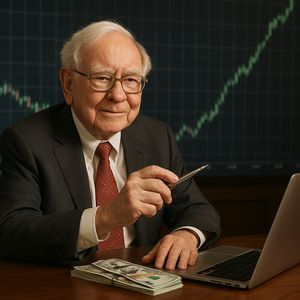When you write about Warren Buffett, it’s pretty easy to run out of superlatives pretty fast. There are minor industries, it sometimes seems to me, whose main function is the Warren Buffett superlative process. And, of course, following his retirement from his vehicle Berkshire Hathaway over the weekend, they are out in full force. I don’t want to join them because it seems ridiculous and redundant, and superfluous. Buffett himself would scold you for telling others what they know already. Tell them something they don’t know, I imagine him saying. And I agree.
But you know, I just can’t help myself. Okay, just quickly. What he has achieved is really magnificent. In the 60 years he has run Berkshire Hathaway, the company’s value rose 5.5 million percent (some calculations put it a bit lower). That’s 19.2% a year, on average. That means if you had invested $100 in Berkshire Hathaway in 1965, that investment would be worth about $3.54 million today. The S&P 500 gained 39,000% over that time, with an annual return of about 10% including dividends.
If you think about how many people are trying to achieve that, and don’t, the achievement just becomes even more impressive. There are inventors who have actually outperformed Buffett: perhaps the greatest were Jim Simons, Stanley Druckenmiller and George Soros, all of whom recorded roughly 30% returns over 30-year periods.
But what made Buffett the statistical outlier of outliers is that he managed it with hundreds of billions under management, his risk was low comparatively and, unlike the investors above, he shunned leverage and derivatives. Buffett’s idea of risk wasn’t volatility; it was not knowing what you’re doing. And he did it all transparently and with accountability.
For years now, it seems to me he enjoyed the role of educator-in-chief as much as his actual function as investor. The way he did that was so interesting in itself. He subjected himself to long questioning sessions at Berkshire’s hugely well attended annual meetings, and he tended to answer with homilies, witticisms and a peculiar kind of wisdom that blends deep insight with severe simplicity.
I actually have a book called The Tao of Warren Buffett that is written by his one-time daughter-in-law Mary Buffett, and noted Buffettologist David Clarke, which aims to bring together some of the smartest, funniest and most memorable sayings.
Here are a few of my favourite examples:
- You should invest in a business that even a fool can run, because someday a fool will.
- The chains of habit are too light to be felt until they are too heavy to be broken.
- Happiness does not buy you money.
- The reaction of weak management to weak operations is often weak accounting.
- We don’t go into companies with the thoughts of effecting a lot of changes. That doesn’t work any better in investments than it does in marriages.
And so it goes … on and on. Every time a coconut. I haven’t even mentioned the most famous.
But rereading them down, one stands out for me: “When the proper temperament joins up with the proper intellectual framework, then you get rational behaviour.” Buffett has spent the past year or so massively decreasing his holdings, even of his most favourite company, Apple. The result is that Berkshire Hathaway now holds $348-billion in cash — a small bite less than the GDP of South Africa. This is so Buffett: “Be fearful when others are greedy, and greedy when others are fearful,” he wrote in his letter to shareholders in 1986.
Yet, if you look at his actual investing decisions, it’s obvious there is a lot more than just being contrarian. The most obvious example is right now: Before US President Donald Trump came into office, the market consensus was that his presidency would be good for investors, as it had been in his first term.
But Buffett decided to choose this moment to be fearful. That was, in retrospect, a monumentally insightful decision, and it reflects on how much his judgement of personality lies behind his investment decisions. To me, this aspect gets far too little attention amid the focus of the financial community on spreadsheets and numbers, and accounting principles.
“You can’t do a good deal with a bad person,” the Tao reflects.
The result is that despite market turbulence this year, Buffett’s wealth has increased by about $16.4-billion in 2025 and Berkshire’s stock is 20% up. It’s noteworthy that the biggest news at this year’s Berkshire fest, other than his resignation, was Buffett making the simple statement: “Trade should not be used as a weapon.” Later he said: “I don’t think it’s a good idea to design a world where a few countries say, ha ha ha, we’ve won.”
There is and has been so much focus on how good Buffett is at investing and, in my humble opinion, too little focus on how much of that is accounted for by just being a good person. DM
This post first appeared in the Daily Maverick. To signup for Daily Maverick's other fabulous newsletters, click below.
Please do forward this post to anyone who might be interested, and by all means ask them to include their email below to become a 💥 free 💥 subscriber. Till next time.



Join the conversation